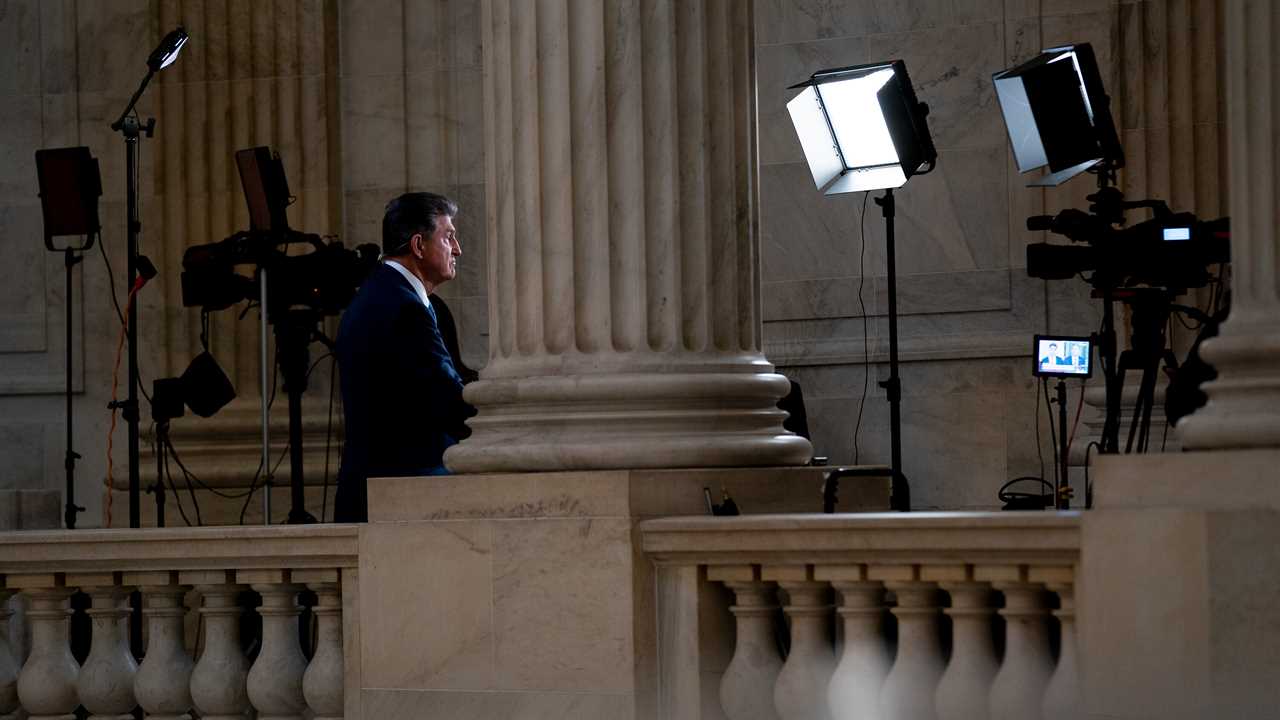
WASHINGTON — At an impromptu news conference this week, Senator Joe Manchin III, Democrat of West Virginia, lamented the “shell games” and “budget gimmicks” he said his party was using to artificially reduce the $1.85 trillion price tag of the spending bill moving through Congress, saying the real cost was probably double that amount.“This is a recipe for economic crisis,” Mr. Manchin warned, suggesting that he would not support a bill without understanding its potential impact on the economy.Four years ago, as Republicans marched ahead with a $1.5 trillion tax cut, top Democrats in Congress assailed them for hiding the true cost of the legislation, arguing that it was “loaded with budget gimmicks” and packed with “stealthy tax tricks” that would saddle the nation with even more debt. Now, as they race to finish their own trillion-dollar domestic policy package, Democrats are employing their own maneuvers to downplay the cost of their bill.President Biden’s new framework for tackling climate change, bolstering child care and a wide range of other economic programs assumes that the package will be fully paid for with an estimated $2 trillion in tax increases on corporations and high earners.But budget experts, along with some moderate Democrats, say the true cost of the legislation will be closer to $4 trillion because of the way the programs are structured and accounted for in the budgetary process. For instance, many of the provisions in Mr. Biden’s framework would expire, or “sunset” after only few years, even though Democrats anticipate that they would eventually be extended.The assumption that spending on those programs will cease in a few years reduces their overall cost during the 10-year budget window that Congress uses to determine whether a bill will add to the federal deficit. That is especially important given the way in which Democrats are trying to pass this particular bill. Lawmakers have limited room for adding to the deficit over a 10-year period because of the budget procedure known as reconciliation that will allow them to pass the legislation without Republican votes.The nonpartisan Congressional Budget Office will eventually provide a formal “score” of cost of the final legislation before it passes, and some lawmakers have begun demanding that tally before they will commit to a vote. On Thursday, the Joint Committee on Taxation released a report projecting that the tax increases in a bill the House is preparing to vote on would raise $1.5 trillion over a decade.The Center for a Responsible Federal Budget, a fiscal watchdog group, suggested that the true cost of the legislation Democrats are crafting could be around $4 trillion given the number of expiring programs.That includes an increased child tax credit and an expanded earned income tax credit that would last for just a year, expanded Affordable Care Act premium tax credits that would last for four years and universal pre-K, which would last for six years.“It’s similar but it’s much more egregious,” said Marc Goldwein, senior policy director for the Committee for a Responsible Federal Budget, comparing the situation to 2017. “They’re cutting the bill in half, more than in half, by having things expire early.”A proposal this week by some House Democrats to temporarily suspend a $10,000 cap on the amount of state and local taxes that households can deduct through 2025 and then reinstate the limit in 2026 highlighted the use of budget gimmicks. Such a plan would have a negligible impact on the 10-year deficit window since the revenue lost over the next five years would be recouped beginning in 2026. But Democrats from high-tax states have said they want the cap repealed entirely, and there is a chance that it would never return after the reprieve.Kent Smetters, the faculty director of The Penn Wharton Budget Model, said the proposal had echoes of the temporary tax cuts that Republicans passed for individuals in 2017. Those cuts are set to expire in 2025 but are expected to be extended because allowing them to sunset would result in a politically unpalatable tax increase on low- and middle-income earners.“You try to get something through on the personal side and hope that a future Congress will take it up and extend it,” Mr. Smetters, whose team has been advising Mr. Manchin on some budget concerns, said in reference to the tax code.Some Democrats have also looked skeptically on that proposal. Senator Robert Menendez, a New Jersey Democrat who has been pushing for permanent relief from the cap on the state and local tax deduction, known as SALT, said this week that it should be targeted to benefit the middle class but not reinstated. Such “gimmicks,” he warned, would mostly benefit the rich.On Wednesday, House Democrats unveiled a bill thatBy: Alan Rappeport
Title: In Spending Bill, Democrats Rely on Budget Gimmicks They Once Derided
Sourced From: www.nytimes.com/2021/11/04/us/politics/congress-budget-tricks.html
Published Date: Thu, 04 Nov 2021 16:18:04 +0000
Read More
Did you miss our previous article...
https://badpoliticians.com/us-politics/authorities-arrest-an-analyst-who-contributed-to-steele-dossier
 UK PoliticsWorld PoliticsVideosPrivacy PolicyTerms And Conditions
UK PoliticsWorld PoliticsVideosPrivacy PolicyTerms And Conditions
